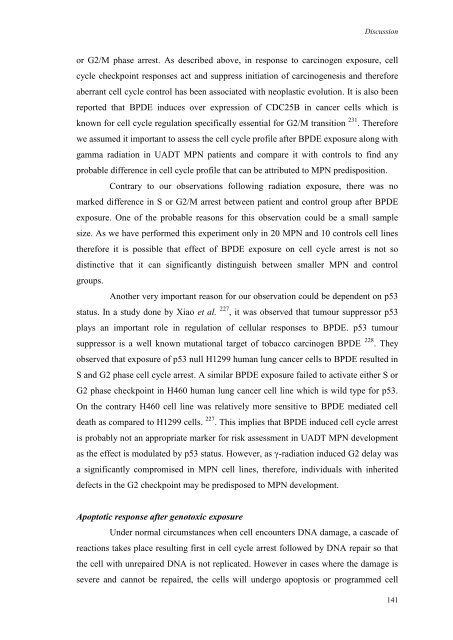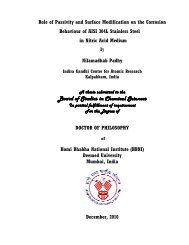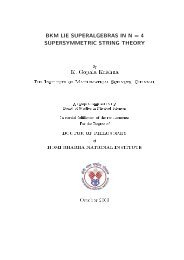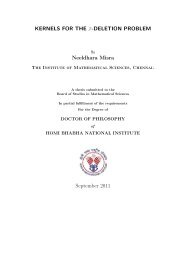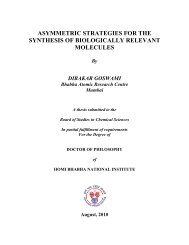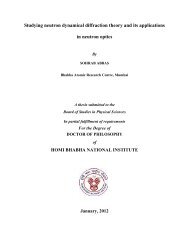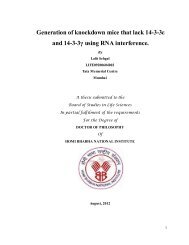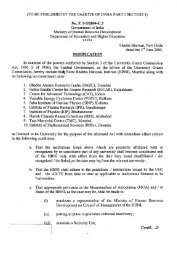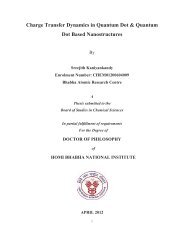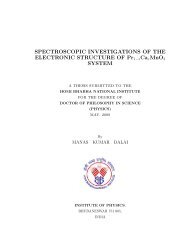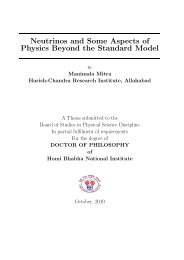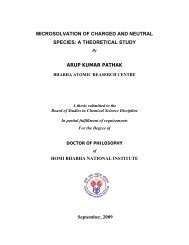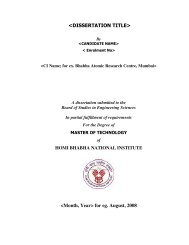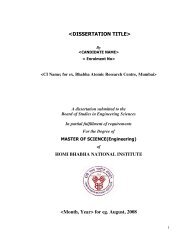LIFE09200604007 Tabish - Homi Bhabha National Institute
LIFE09200604007 Tabish - Homi Bhabha National Institute
LIFE09200604007 Tabish - Homi Bhabha National Institute
You also want an ePaper? Increase the reach of your titles
YUMPU automatically turns print PDFs into web optimized ePapers that Google loves.
Discussion<br />
or G2/M phase arrest. As described above, in response to carcinogen exposure, cell<br />
cycle checkpoint responses act and suppress initiation of carcinogenesis and therefore<br />
aberrant cell cycle control has been associated with neoplastic evolution. It is also been<br />
reported that BPDE induces over expression of CDC25B in cancer cells which is<br />
known for cell cycle regulation specifically essential for G2/M transition 231 . Therefore<br />
we assumed it important to assess the cell cycle profile after BPDE exposure along with<br />
gamma radiation in UADT MPN patients and compare it with controls to find any<br />
probable difference in cell cycle profile that can be attributed to MPN predisposition.<br />
Contrary to our observations following radiation exposure, there was no<br />
marked difference in S or G2/M arrest between patient and control group after BPDE<br />
exposure. One of the probable reasons for this observation could be a small sample<br />
size. As we have performed this experiment only in 20 MPN and 10 controls cell lines<br />
therefore it is possible that effect of BPDE exposure on cell cycle arrest is not so<br />
distinctive that it can significantly distinguish between smaller MPN and control<br />
groups.<br />
Another very important reason for our observation could be dependent on p53<br />
status. In a study done by Xiao et al. 227 , it was observed that tumour suppressor p53<br />
plays an important role in regulation of cellular responses to BPDE. p53 tumour<br />
suppressor is a well known mutational target of tobacco carcinogen BPDE 228 . They<br />
observed that exposure of p53 null H1299 human lung cancer cells to BPDE resulted in<br />
S and G2 phase cell cycle arrest. A similar BPDE exposure failed to activate either S or<br />
G2 phase checkpoint in H460 human lung cancer cell line which is wild type for p53.<br />
On the contrary H460 cell line was relatively more sensitive to BPDE mediated cell<br />
death as compared to H1299 cells. 227 . This implies that BPDE induced cell cycle arrest<br />
is probably not an appropriate marker for risk assessment in UADT MPN development<br />
as the effect is modulated by p53 status. However, as γ-radiation induced G2 delay was<br />
a significantly compromised in MPN cell lines, therefore, individuals with inherited<br />
defects in the G2 checkpoint may be predisposed to MPN development.<br />
Apoptotic response after genotoxic exposure<br />
Under normal circumstances when cell encounters DNA damage, a cascade of<br />
reactions takes place resulting first in cell cycle arrest followed by DNA repair so that<br />
the cell with unrepaired DNA is not replicated. However in cases where the damage is<br />
severe and cannot be repaired, the cells will undergo apoptosis or programmed cell<br />
141


